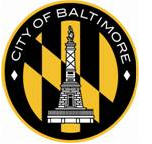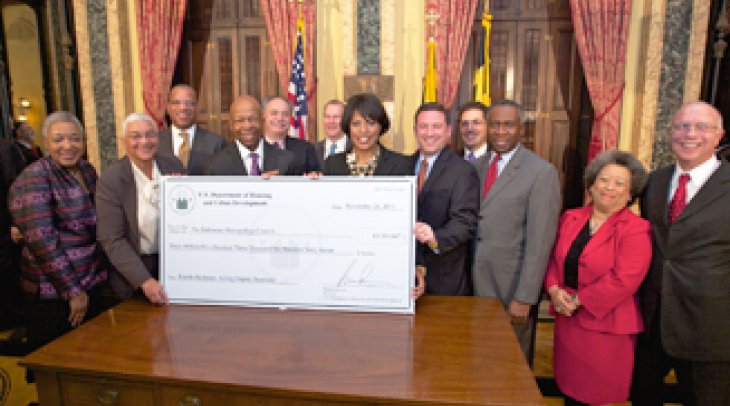HUD Announces the Baltimore Metropolitan Council as a Recipient of a 2011 Sustainable Communities Award
Monday Nov 21st, 2011

FOR IMMEDIATE RELEASE

Grants will create jobs, improve housing, transportation and economic vitality of the Baltimore Region
Mayor Stephanie Rawlings-Blake welcomed the U.S. Department of Housing and Urban Development’s (HUD) Acting Deputy Secretary Estelle Richman to announce that the Baltimore Metropolitan Council (BMC) as one of the recipients of the 2011 Sustainable Communities Grants, totaling over $97 million. Twenty seven communities and organizations will receive Community Challenge grants and Baltimore is one of 29 regional areas that will receive a Regional Planning grant. The $3.5 million dollar grant will be used to create a Regional Plan for Sustainable Development for the entire Baltimore Region. The goal of the Sustainable Communities grants is to help communities and regions improve their economic competitiveness by connecting housing with good jobs, quality schools and transportation.
“Our nation’s ability to compete in a global economy and create jobs is dependent upon how quickly and efficiently we can connect our workers and families to education and employment opportunities.” said HUD Secretary Donovan. “This year we are especially proud that we had a particular focus on funding proposals that included more chambers of commerce and economic development corporations as core partners.
“On behalf of the Baltimore Metropolitan Council, I want to thank HUD for their support of the Baltimore region,” said Mayor Stephanie Rawlings-Blake, the Baltimore Metropolitan Council Chair. “This grant is going to help us plan for the future, and together improve our long-term strategies for housing, transportation, and workforce development.”
The Regional Plan in Baltimore will follow an 8 phase process over the next three years that will incorporate housing, transportation, and workforce development strategies to drive growth and investment over the next 25 years.
"I'm so proud that the Baltimore Metropolitan Council is tackling the question of the region's long-term sustainability," said U.S. Senator Barbara Mikulski, a senior member of the Senate Transportation, Housing and Urban Development, and Related Agencies (THUD) Appropriations Subcommittee that funds HUD. "This grant will help make sure the Baltimore region stays competitive for residents and businesses alike, so everyone can have a piece of the American dream."
Baltimore’s regional plan will produce stand alone regional housing and workforce development plans as well as a series of robust demonstration efforts in green and healthy housing, watershed protection, transit oriented development along with a financing plan to fund the work.
“These grants will be leveraged with local funds more than doubling the investment and, helping to create new visions for how communities and regions plan for housing, transportation, workforce development and the quality of life of their residents for generations to come,” said Richman. “When 52% of the average working family’s income is devoted to housing and transportation costs alone, we know that we have a responsibility to fix that and to provide housing and transportation options that can improve their quality of life and economic stability.”
Richman and U.S. Congressman Elijah E. Cummings presented the grant check to the BMC this morning.
“Part of rebuilding our economy will be rebuilding our nation,” said Cummings. “We must create new transportation and workforce infrastructures that allow us to take advantage of the incredible new technologies and practices that our country is at the forefront of creating. This grant will help Baltimore create jobs and protect our beautiful natural resources so that our children and children yet unborn will be able to experience a nation better, stronger and more advanced than the one we were given.”
HUD’s Community Challenge Grants aim to reform and reduce barriers to achieving affordable, economically vital and sustainable communities. The funds are awarded to communities, large and small, to address local challenges to integrating transportation and housing. Such efforts may include amending or updating local master plans, zoning codes, and building codes to support private sector investment in mixed-use development, affordable housing and the re-use of older buildings. Other local efforts may include retrofitting main streets to provide safer routes for children and seniors, or preserving affordable housing and local businesses near new transit stations.
The Regional Planning Grant program encourages grantees to support regional planning efforts that integrate housing, land-use, economic and workforce development, transportation, and infrastructure developments in a manner that empowers regions to consider how all of these factors work together to create more jobs and economic opportunities. The program will place a priority on partnerships, including the collaboration of arts and culture, philanthropy, and innovative ideas to the regional planning process. Recognizing that areas are in different stages of sustainability planning, HUD has established two categories for the Regional Planning Grant program. The first supports communities that are beginning the conversation about how best to align their housing, transportation, environment, and other infrastructure investments. The second recognizes that some communities have already achieved significant momentum and are prepared to move toward completion and implementation of regional plans for sustainable development.
As was the case last year, the demand for both programs far exceeded the available funding. This year HUD received over $500 million in funding requests from communities in all 50 states, the District of Columbia, and Puerto Rico for the $96 million in available funding. This year’s grants will impact 45.8 million Americans by helping their communities and regions become more efficient and competitive while improving quality of life. Combined with the 87 grants funded last year, this program is providing opportunities for the more than 133 million Americans who live in regions and communities working to shape local plans for how their communities will grow and develop over the next 50 years.
This year’s grantees continue to reflect a diverse group of states, regions and communities that believe in sustainability. Grants were awarded in the states of Arizona, Arkansas, California, Colorado, Connecticut, Florida, Idaho, Illinois, Iowa, Kansas, Louisiana, Maryland, Massachusetts, Michigan, Missouri, Montana, Nebraska, Nevada, New Hampshire, New Jersey, New Mexico, New York, North Carolina, North Dakota, Oregon, Pennsylvania, Rhode Island, Tennessee, Texas, Vermont, Washington and Wyoming.
Community Challenge Grants and Regional Planning Grants are also significantly complimented and leveraged by local, state and private resources. This year, HUD’s investment of $95.8 million is garnering $115 million in matching and in-kind contributions – which is over 120% of the Federal investment – from the 56 selected grantees. This brings to total public and private investment for this round of grants to over $211 million. These grants are part of the Partnership for Sustainable Communities, which represents an association between HUD, the U.S. Department of Transportation, and the U.S. Environmental Protection Agency to ensure that the agencies’ policies, programs, and funding consider affordable housing, transportation, and environmental protection together. This interagency collaboration gets better results for communities and uses taxpayer money more efficiently.
Coordinating federal investments in infrastructure, facilities, and services meets multiple economic, environmental, and community objectives with each dollar spent. The Partnership is helping communities across the country to create more housing choices, make transportation more efficient and reliable, reinforce existing investments, and support vibrant and healthy neighborhoods that attract businesses.
“The demand for sustainability grants is very high; we would have needed $500 million to fund all proposals we received this year.” said HUD Office of Sustainable Housing Communities (OSHC) Director, Shelley Poticha. “We are confident that the mix of rural and urban proposals that we selected this year will have a great impact in their communities and will create nearly 2,000 jobs.”
For a complete listing of this year’s grantees and their proposals, please visit www.hud.gov.